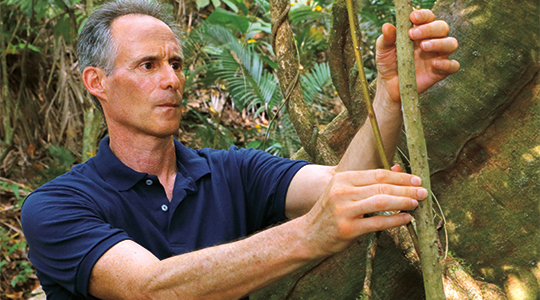Marquette ecology professor receives Way Klingler Fellowship in science
The focus of Dr. Stefan Schnitzer's lab has been understanding the forces that structure plant communities, maintain species diversity, control species distributions and allow species to co-exist.
MILWAUKEE — Dr. Stefan Schnitzer, Mellon Distinguished Professor of Ecology, is the recipient of this year’s Way Klingler Fellowship Award in science.
The focus of Schnitzer’s lab has been understanding the forces that structure plant communities, maintain species diversity, control species distributions and allow species to co-exist. One aspect has been the community ecology of lianas (woody vines) and the role they play in forest dynamics.
Many deforested areas are now being replaced with regenerating secondary forest, leading to more forest cover in some areas than there was 100 years ago. The goal of Schnitzer’s research, for which he will use the Way Klingler Fellowship Award, is to learn the effects of the aggressive proliferation of lianas on secondary forests.
“We propose to test the hypothesis that liana infestation early in succession redirects tropical forests toward a recalcitrant low-canopy, low-diversity and low-carbon stable state,” says Schnitzer, the Mellon Distinguished Professor of Ecology. “If regenerating tropical forests fail to uptake carbon at the rate that was previously taken up by old- growth forests, then tropical forests could switch from net carbon sinks to net carbon sources, which would rapidly accelerate global climate change. Because tropical forests store more than 40 percent of the earth’s terrestrial carbon, the effects of lianas on the global carbon cycle could be substantial.”
The research theorizes that lianas may redirect forest succession toward a low-canopy forest dominated by lianas and tree species with low wood density, which store far less carbon and can persist for decades with potentially serious consequences for global carbon dynamics.
The conceptual framework and models which underlie this project are based on Schnitzer’s early work, which won a commendation from the John L. Harper Young Investigator’s Award from the Journal of Ecology. This paper was published before there was any indication that vines were increasing in tropical forests. Now that vines are increasing in abundance and forest regeneration is at an unprecedented level, testing these ideas is more important than ever.
The Way Klingler Fellowships are awarded to full-time regular faculty at the associate or full professor rank who have potential for significant scholarship. One fellowship in science and one in humanities is awarded. The science fellow receives $50,000 annually for three years to fund critical research that requires time, access to information and travel.
NOTE: This press release was submitted to Urban Milwaukee and was not written by an Urban Milwaukee writer. While it is believed to be reliable, Urban Milwaukee does not guarantee its accuracy or completeness.
Mentioned in This Press Release
Recent Press Releases by Marquette University
Lucas Lawas Earns Spot on BIG EAST Honor Roll
Apr 7th, 2025 by Marquette UniversityLawas notched a career-best 17 saves against then-No. 14 Georgetown on Saturday
Marquette Law Poll supplement: Open-ended answers offer insights on Trump favorability
Dec 18th, 2024 by Marquette UniversityTrump earned 53% approval in national survey released Dec. 18























